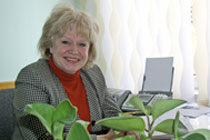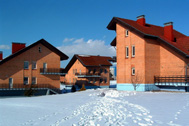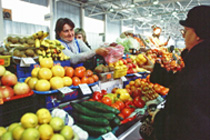Chernobyl - An interview with Lilya Shestakova, Director of the SOS Social Centre Borovljany, near Minsk in Belarus
25/04/2006

How many children do you care for and who are the centre's target groups?
Four hundred and eighty children stayed in the SOS Social Centre in 2005; over ten years 2,732 children have been helped at the centre. We have two main target groups: the first group is children who already have cancer or cancer-related illnesses, who are treated at the neighbouring Children's Cancer Clinic. They live in our house for up to a year.
The second target group is the people who live in the contaminated areas - normally big families - who stay here for three weeks.
We also have two other projects. We send children who are in a ‘transition period’ - from being sick with cancer to leading a healthy life again - to the SOS Caldonazzo summer camp in Italy. The second project is a summer camp here in Belarus for children from families that have economic problems. Last year 180 kids stayed in the camp. In the future we would like to broaden the direction of our work as there are many children living in polluted areas who need treatment.

Have the target groups changed in ten years?
When we started the centre it was only for families living in the polluted areas. Then the clinic was opened and we started to offer our houses to the children who were fighting cancer - as it is quieter and cosier here than in the hospital. Later on we started the other projects.
What kind of help do you offer?
We offer many different types of support: from social and psychological support to educational, for example how to feed children in a healthy way, how to cook food grown in the polluted areas so that it isn't a health risk to humanitarian support and also juridical - through co-operation with a lawyer. We consider the latter very important - people simply don't know how to fill in documents and where to go for help.
What are the challenges you face and the problems of the families who stay at the centre?

Our biggest challenge is to try and forget that the kids are ill. We must regard them as children, not sick children. It's also important to find an individual approach for everybody.
In families with a sick child there may be many problems, either with the child, with the mother or between the parents. Usually, parents keep the fact that the child has health problems a secret - especially in small villages - because they fear the child will be ostracised by society.
Occasionally, one of the parents leaves the family because of the child's illness. Then it is our job to help the remaining parent psychologically so that he or she can concentrate on the main issue - helping the child to defeat cancer.
Is the Chernobyl catastrophe still a hot topic today, 20 years after the accident?
The Chernobyl catastrophe will be a topic in Belarus for many years. Increased cases of cancerous diseases - also among children - are adequate reasons for that. We can see the theme will not disappear - we have children in rehabilitation from all regions of Belarus, not only from the most-polluted areas.
People definitely see there is a link between the illnesses and the catastrophe, although the medics do not say that. It is also a political and financial question; if the authorities admitted the link, it would mean an even heavier burden on the budget.
Today there are over 1.5 million people who live in polluted areas. During the 20 years following the catastrophe the number of thyroid cancer cases has increased 87-times among children, twelve-times among youth and five-times among adults. The generation that was born shortly after the Chernobyl catastrophe are now becoming parents themselves. Unfortunately their babies will almost certainly be suffering from some kind of illness or disability.
Relevant Countries: Belarus.